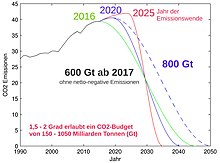Climate target: Difference between revisions
Content deleted Content added
AlecGargett (talk | contribs) An emissions target and an emissions budget are two separate things. However, I have copied relevant material and references across from the emissions budget article. |
(No difference)
|
Revision as of 01:56, 8 December 2019

An emissions target or greenhouse gas emissions reduction target is the central policy instrument of international emissions reduction policy and politics and a key pillar of climate action.[2][3][4][5][6][7][8]
An "emissions target" may be distinguished from an emissions budget, as an emissions target may be internationally or nationally set in accordance with objectives other than a specific global temperature. This includes targets created for their political palatability, rather than ones focused on climate science warnings.[9][10]
See also
References
- ^ Christiana Figueres u. a. (2017), "Three years to safeguard our climate", Nature (in German), vol. 546, no. 7660, pp. 593–595, doi:10.1038/546593a, PMID 28661507
- ^ Meinshausen, Malte; Meinshausen, Nicolai; Hare, William; Raper, Sarah C. B.; Frieler, Katja; Knutti, Reto; Frame, David J.; Allen, Myles R. (30 April 2009). "Greenhouse-gas emission targets for limiting global warming to 2 °C". Nature. 458 (7242): 1158–1162. CiteSeerX 10.1.1.337.3632. doi:10.1038/nature08017. ISSN 1476-4687. PMID 19407799.
- ^ Matthews, H. Damon; Zickfeld, Kirsten; Knutti, Reto; Allen, Myles R. (2018). "Focus on cumulative emissions, global carbon budgets and the implications for climate mitigation targets". Environmental Research Letters. 13 (1): 010201. doi:10.1088/1748-9326/aa98c9. ISSN 1748-9326.
- ^ Raupach, Michael R.; Davis, Steven J.; Peters, Glen P.; Andrew, Robbie M.; Canadell, Josep G.; Ciais, Philippe; Friedlingstein, Pierre; Jotzo, Frank; Vuuren, Detlef P. van (21 September 2014). "Sharing a quota on cumulative carbon emissions". Nature Climate Change. 4 (10): 873–879. doi:10.1038/nclimate2384. ISSN 1758-6798.
- ^ Friedlingstein, P., Andrew, R. M., Rogelj, J., Peters, G. P., Canadell, J. G., Knutti, R., ... & Le Quéré, C. (2014). Persistent growth of CO2 emissions and implications for reaching climate targets. Nature geoscience, 7(10), 709.
- ^ Jackson, Tim. "2050 is too late – we must drastically cut emissions much sooner". The Conversation. Retrieved 2019-09-23.
- ^ Zickfeld, K.; Arora, V. K.; Gillett, N. P. (2012-03-01). "Is the climate response to CO2 emissions path dependent?". Geophysical Research Letters. 39 (5): L05703. doi:10.1029/2011gl050205. ISSN 1944-8007.
- ^ Cite error: The named reference
:2was invoked but never defined (see the help page). - ^ Babiker, Mustafa H.; Eckaus, Richard S. (2002-09-01). "Rethinking the Kyoto Emissions Targets". Climatic Change. 54 (4): 399–414. doi:10.1023/A:1016139500611. ISSN 0165-0009.
- ^ Zickfeld, Kirsten; Eby, Michael; Matthews, H. Damon; Weaver, Andrew J. (2009-09-22). "Setting cumulative emissions targets to reduce the risk of dangerous climate change". Proceedings of the National Academy of Sciences. 106 (38): 16129–16134. doi:10.1073/pnas.0805800106. ISSN 0027-8424. PMC 2752604. PMID 19706489.
